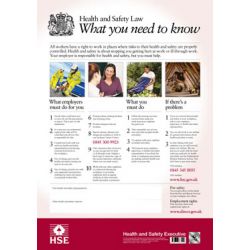You may think that business start-up’s in the current economic climate would be a rare occurrence yet government statistics still report “Business Births” as they term it at approaching 200,000 a year. Starting a business is stressful enough with so much red tape and regulations to plough through. Work place safety including fire safety is just one aspect but at least we can help with a rundown of 10 essential provisions to put budding entrepreneurs on the right side of the law.
-
- Display a Health and Safety Law poster prominently in the premises either on reception or in a communal staff area.

- Display Fire Signs detailing what to do in the event of fire, the designated escape routes and fire assembly points.
- Display a No Smoking Sign at each public entrance to the premises
- Conduct a fire risk assessment and utilise the outcome to determine any extra fire safety provisions such as Fire Extinguishers. If you need help purchase one of our self help manuals or step by step fire risk assessment tools. It’s far less expensive that employing a consultant.
- Purchase a Fire Log Book to record fire safety training, fire equipment maintenance records, fire drills and fire action plans. This is mandatory if you employ 5 or more people.
- Accidents can happen in any business so a First Aid Kit is a good safeguard.
- If the business extends over several rooms install a Rotary Hand Bell in a usually occupied room that can be heard throughout the building.
- In unoccupied rooms such as storage, server or computer rooms that present a fire risk install Smoke Detectors. For large premises extending to many rooms or more than one floor interlinked wired smoke detectors and alarms are preferred.
- If in the course of your business activity you store and use quantities of hazardous substances, described generally as toxic, corrosive or flammable you should store these in a suitable Flammable Storage Cabinet compliant with the COSHH or DSEAR regulations.
- Having done all this you should then bring in your insurers and ensure you have third party liability insurance appropriate to your business. Having a clear fire and safety policy in place should help with the premiums.
- Display a Health and Safety Law poster prominently in the premises either on reception or in a communal staff area.

